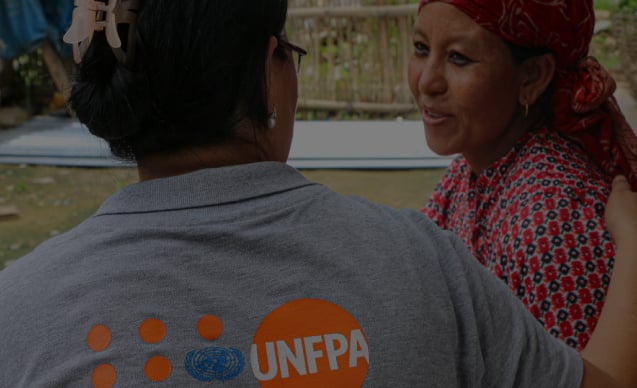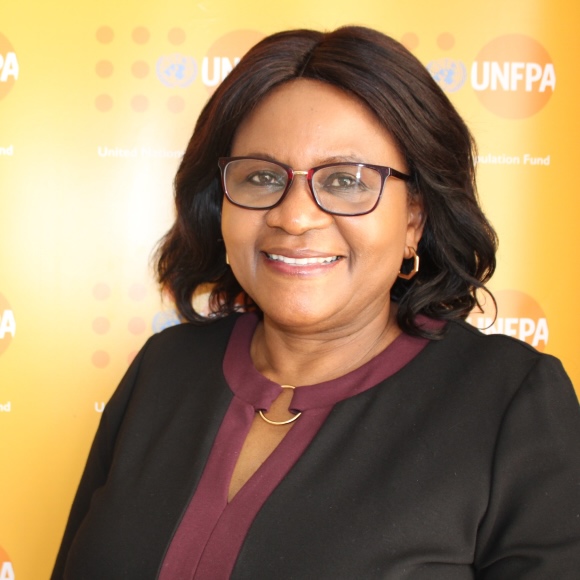About Us
About UNFPA Uganda
With an estimated population of 41.6 million which is expected to reach 55 million by 2030. Due to population growth rate of 3 per cent, total fertility rate is high at 5.4, contributing to a youthful structure where young people below 30 years represent 75 per cent of the population. The Government has prioritized strategic investments in the health, education and empowerment of young people to accelerate the demographic transition and harness the demographic dividend. This is well articulated in the national Vision 2040, which aims to transform the country from a predominantly rural and low-income country to a competitive upper middle-income economy by 2040, and is further defined in the third national development plan (NDPIII) 2020/21-2024/25. In this context, UNFPA works to deliver a world where every pregnancy is wanted, every child birth is safe and every young person’s potential is fulfilled.
Guided by the International Conference on Population and Development (ICPD) Plan of Action, UNFPA Uganda has a long and successful track record of working with the government of Uganda, cultural and religious institutions, civil society organizations including youth organizations, and the private sector to improve the lives of women and young people.
UNFPA Uganda is currently running the GoU/UNFPA 9th Country Programme (2021-2025). The Country Programme is aligned with national priorities, as outlined in National Vision 2040, National Development Plan III (2020/21-2024/25), the United Nations Sustainable Development Cooperation Framework for Uganda (2021-2025) and the UNFPA Strategic Plan 2018-2021, and contributes to harnessing the demographic dividend. UNFPA is the lead agency that supports Government of Uganda to collect census and survey population data to inform and influence policy on sexual reproductive health, gender-based violence and HIV.
Ending preventable maternal death
The maternal mortality ratio has decreased slowly between 2006 and 2016 from 435 to 336 per 100,000 live births, with 28 per cent of maternal deaths occurring among young women, 15-24 years. Despite improvements in skilled birth attendance rates at 74 per cent, and health facility deliveries at 73 per cent, shortage of health workers, inadequate emergency obstetric care especially at referral points, gender inequality, and socio-cultural factors inhibit access to quality care. The maternal and perinatal death review system remains weak particularly at district and health facility levels. UNFPA supports the Government of Uganda to ensure provision of quality family planning services in an equitable matter through specific programmes focusing on high burdened regions in the country.
Ending unmet need for family planning
Unmet need for family planning in Uganda has declined, but remains high at 32 per cent, with adolescents 15-19 years at 30 per cent. Modern contraceptive prevalence rate is 35 per cent, and at 9.4 per cent among married young women 15-24 years with wide regional, rural and urban disparities. The adolescent pregnancy rate stagnated at 25 per cent among girls 15-19, with 12 per cent of adolescent girls being married, according to the 2016 Uganda demographic health survey, contributing to 23 per cent of school dropouts. Limited access to health and community-based services, inadequate number of skilled staff, commodity stock-outs at health facilities, negative socio-cultural values, poor adolescent responsive health systems, and weak implementation of policies and strategies are key challenges. The Government of Uganda has recommitted to the Family Planning 2020 pledge to continue promoting universal access to all methods of family planning and to reduce the unmet need for family planning to 10 per cent by 2022. Despite increased government funding for reproductive health commodities from 2.1 million dollars to 4.3 million dollars for the 2019/2020 fiscal year, a gap of $9.8 million dollars is required to ensure equitable and universal access to family planning. UNFPA supports Government of Uganda to address human resource gap so that there is an adequate number of skilled staff to provide a wide range of family planning methods; to address stock-outs at health facilities; to expand of community-based service outlets; as well as support to demand generation for family planning services through information programmes to dispel myths and misconceptions about contraceptive use.
Ending gender-based violence against women and harmful practices
Young people continue to suffer sexual reproductive ill-health including sexually transmitted infections among those who are sexually active. Teenage pregnancy rate, although still high, declined from 31 per cent in 2001 to 25 per cent in 2016. Teenage pregnancy contributes to 28 percent of maternal death in Uganda. Although HIV prevalence declined from 7.3 per cent in 2011 to 6.2 per cent in 2016, it remains higher among women, with young women 15-24 years bearing the greater burden with infection rates at 3.3 per cent, four times that of their male counterparts. The National Strategic Plan for HIV and AIDS 2014- 2020 highlighted the key drivers as risky sexual behaviours, low comprehensive knowledge on HIV, low condom use at high risk sexual activity, low access to information and services especially among young people, stigma and discrimination, harmful socio-cultural practices including gender based violence and weak integration of sexual and reproductive health, including HIV services. As a result, 44 percent of new HIV infections occur among young people 15-24 years.
Sexual violence, early marriage and female genital mutilation impact on young people’s ability to enjoy their human rights and explore their full potential. The Common Country Analysis notes that gender inequality and violence are manifested throughout the life cycle of women and girls in Uganda, despite a strong policy and legal framework to promote gender equality. The prevalence of gender-based violence is high, with 56 per cent of the female population experiencing spousal violence and 22 per cent of women experiencing sexual violence in 2016. The national prevalence of female genital mutilation is 0.3 per cent, and is higher in communities such as Sabiny, Tepeth, and Pokoth. The country is also a signatory to several international human rights treaties but has continued to face challenges with obligations to submit status reports to the monitoring bodies. UNFPA advocates for the rights of young people, and works to influence policy to ensure young people’s access to accurate information and services related to sexuality and reproductive health.




